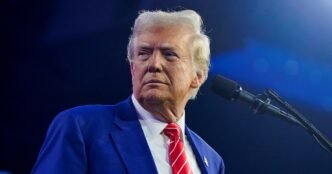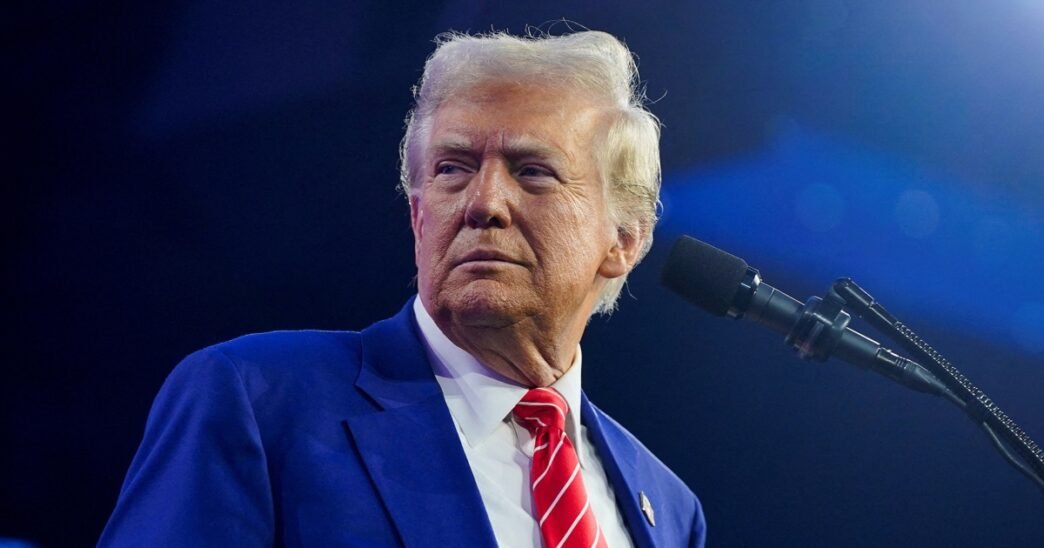In the weeks and months after Donald Trump won his shock election victory in 2016, business and tech leaders began a steady march leftward, adopting policies and postures to counter his influence on America.
Media outlets reckoned with what some saw as their leading role in helping Trump get elected and pledged to be ruthless and unintimidated in their coverage of him and his administration.
And Democrats, boosted by a grassroots “resistance,” readied for their biggest fight yet.
That couldn’t be any more different from the run-up to Trump’s second term.
Now, executives are bending policies — and bending a proverbial knee — by abandoning their social and environmental agendas in manners that could appeal to Trump. Leaders of multiple major media platforms appear to be reorienting their coverage to be less antagonistic. And Democrats, without much of an active resistance to underpin them, have taken a wait-and-see approach to a new president with whom they already have eight years of experience.
“We should treat him like a normal president,” a senior aide to a Democratic senator said. “Because this is what normal presidents look like in America now.”
The shift is due in no small part to how Trump won last fall. Whereas in 2016 many saw a fluke, Trump this time swept the swing states and won the popular vote. His victory came after episodes like the Jan. 6 attack on the Capitol and his criminal indictments — headwinds many believed were insurmountable.
What’s more, much of his opposition, at least for now, appears to be drained after having fought him for nearly a decade. Now, Democrats feel they must pick their spots better.
“My mission: be purposeful,” Rep. Eric Swalwell, D-Calif., whose profile soared as a leading Trump advers during the president-elect’s first term, wrote to NBC News. “Don’t chase the crazy. Bring it all back to ‘how does that (ahem, invading Greenland) lower the cost of eggs?’”
In turn, Trump is basking in a relatively warm embrace. His inaugural committee has raised so much money that it has run out of perks to give donors, The New York Times reported. Meta, the parent company of Facebook and Instagram, which banned Trump from those social media platforms after the 2021 attack on the Capitol, has donated $1 million to his inaugural fund. So has Amazon, which this week announced it will release a Melania Trump document through its Amazon Prime platform. The incoming first lady is listed as an executive producer of the project, which Amazon licensed for $40 million, Puck News reported.
On Tuesday, Meta CEO Mark Zuckerberg cited the political climate’s shift back toward Trump as his company made a flurry of moves indicating a desire to get right with the right. Amazon CEO Jeff Bezos, meanwhile, has spoken optimistically about Trump’s potential anti-regulatory agenda in a new term. And five of the country’s biggest banks have in recent weeks announced their withdrawals from a pandemic-era climate coalition, the latest pullback from the environmental, social and corporate governance, or ESG, initiatives that became a major target for criticism on the right.
“Maybe I’m overthinking it, but it is a little concerning that everybody sort of just said, ‘We’ve got to give this guy what he wants,’ right?” a Pennsylvania Democrat said. “I just don’t know where the backstop is here.”
Trump views the dynamic more charitably.
“Everybody wants to be my friend,” he said in December.
NBC News spoke with more than a dozen Democratic and Republican operatives and lobbyists, granting many of them anonymity to speak openly about the shifting energy that has followed Trump’s win.
A Republican lobbyist said the significant donations to Trump’s inaugural fund and the abandonment of left-leaning corporate policies come as executives are “scared to death” of what the incoming administration could mean for them.
“They’re going to pretend like they’re in control,” this person said, adding, “They’re just kind of nervous about being shut out entirely.”
“They’re pulling out of work from home. ESG. DEI,” this person continued, referring to diversity, equity and inclusion initiatives. “They’re bending to his will, not the other way around.”
‘Surrender, or acceptance’
Meta’s moves are among the most noteworthy. The company plans to elevate Republican Joel Kaplan to lead its global policy team, and on Monday it added Ultimate Fighting Championship CEO Dana White, a Trump ally, to its board. Meta also announced it was ending a fact-checking program and replacing it with a community-driven system similar to the one Trump ally Elon Musk’s X uses. And Zuckerberg boasted that the company was relocating content moderators from liberal California to ruby red Texas.
“Remember, at the start of Trump’s first term, the mantra on the left is to not normalize,” a veteran tech industry lobbyist said. “Do not normalize. That’s no longer the case.”
“So it’s not just a question for the tech companies, but a larger societal, cultural and political issue,” this person added. “It’s a kind of surrender, or acceptance.”
Eight years ago many top tech executives treated Trump as something of a curiosity. Meetings with him were more perfunctory and for show. Relationships soon worsened. Trump stridently criticized Bezos and the newspaper he owns, The Washington Post. Zuckerberg, too, was a frequent target, including last year, when Trump threatened him with “life in prison” if he did anything Trump viewed as illegal during the campaign. Both men have met privately with Trump in recent weeks, as have Apple CEO Tim Cook, Alphabet and Google CEO Sundar Pichai and former Alphabet President Sergey Brin.
A source close to Trump said tech executives like Zuckerberg and Bezos are “smart to play ball” with him in a way they weren’t eight years ago.
“They know the anti-Trump side lost, and they know if they aren’t playing nice with him, he’ll try to bust them up,” this person said. “It’s probably a mix of fear, a mix of times-are-changing.”
A Republican operative close to Trump’s circle described corporate America’s response to the 2024 election as the exact inverse of its response after 2016.
“It’s pretty clear that culturally, [Meta] and other companies feel like ‘You know what? We actually don’t need to be bullied by activists anymore,’” the operative said.
Against that backdrop, intense disputes have broken out at a number of leading news organizations, including Bezos’ Post as the newsroom navigates Trump’s return to power.
The Post, even though its editorial page staff drafted an endorsement of Vice President Kamala Harris, declined back a presidential candidate — a widely criticized decision that sources attributed to Bezos — just two weeks before the election. Last week, Pulitzer Prize-winning cartoonist Ann Telnaes quit the paper after editors refused to publish her drawing depicting Bezos and other corporate leaders bending the knee to Trump. The Post’s editorial page editor said the cartoon was rejected because the content was too similar to a recent column and that the decision was not a “reflection of a malign force.”
Meanwhile, the owner of the Los Angeles Times, Patrick Soon-Shiong, prompted resignations last year when he killed his editorial board’s planned endorsement of Harris. Soon-Shiong has since proposed instituting a “bias meter” to evaluate the paper’s published opinions while trying to steer a more moderate direction.
At broadcast and cable outlets, there has been turmoil, too. ABC paid $15 million to settle a defamation lawsuit with Trump. And at MSNBC, “Morning Joe” hosts Joe Scarborough and Mika Brzezinski, who have been known for their critical stance toward Trump in recent years, traveled to his Mar-a-Lago resort to meet with him after the election. Both episodes drew some criticism. While ABC did not elaborate on its decision to settle the suit, Scarborough and Brzezinski have defended their meeting with Trump as a useful reporting trip that helped inform their viewers.
‘No one’s quite sure what to do’
For Democrats, this is a confusing time. Many state-level leaders say they will find areas to work together with the administration while they push back against efforts they believe are harmful. In Congress, Democrats have expressed openness to some of Trump’s more controversial Cabinet selections, like his pick for the Department of Health and Human Services, Robert F. Kennedy Jr. Others signed onto a Republican-backed immigration bill that advanced in the Senate on Thursday, the Laken Riley Act, which would allow the Department of Homeland Security to detain noncitizens who are charged with certain crimes.
“No one’s quite sure what to do,” the Pennsylvania Democrat said. “I haven’t seen anything yet that shows me anybody’s quite ready for this.”
Democrats, including Colorado Gov. Jared Polis and Senate Majority Leader Chuck Schumer, of New York, have even expressed openness to Trump’s calls to annex Greenland or rename the Gulf of Mexico — if other conditions are met first. Sen. John Fetterman, D-Pa., who has expressed more openness to Trump than his Democratic colleagues, announced Thursday that he will soon meet with Trump, becoming the first sitting Democratic senator to do so since Trump won last fall.
“It’s unnecess to commit to cooperation with him at this point,” the Pennsylvania Democrat said, adding, “There’s nothing to gain from that.”
In a video posted to social media on Thursday, many Senate Democrats laid out their posture entering a second Trump administration.
“We are not here because of who we are against,” the senators read. “We are here because of who we are for. … We are here to fight for Americans. We will work with anyone if they want to make life better for you. But if Donald Trump and Senate Republicans do things to hurt you, we will fight.”
The Republican operative close to Trump’s circle said it’s clear that this time around the Democratic response is “100% different” from what it was after Trump’s 2016 win.
“The resistance is dead,” this person said. “There is no resistance anymore.”
But without Trump’s even having taken office yet, some Democrats say it’s far too soon to write off the anti-Trump opposition. Once he begins enacting policies, Democrats and outside allies will have more to push back on.
Amanda Litman, a co-founder and the president of Run for Something, a grassroots progressive candidate recruitment group, said more than 12,000 people have signed up to run for offices since Trump’s victory, a number she said nearly matched the total number of people who signed up in 2017, its launch year.
“A lot of the big ‘resistance’ stuff didn’t really start happening until after Trump actually took office,” she said. “It feels really early to say the resistance is fake or is dead. I think it’ll look different. I think it’ll feel different.”
Both Democrats and Republicans also urged caution on the olive branches and calls for bipartisanship Democrats have offered in recent weeks, noting that after Trump’s 2016 victory, Schumer also laid out areas in which the incoming administration and Democratic leaders could work together — an effort that in no way stunted the anti-Trump backlash.
But for Democrats who were working in Washington during Trump’s last transition, there was acknowledgment that something very different is happening now — and that there is a wider array of policies Democrats will be more likely to work with Trump and his allies on, with the Laken Riley Act serving as an early example.
“There is an openness here this time that just did not exist last time,” said the senior aide to a Democratic senator. “And I think it’s especially [true] on immigration.”
This person said the driving force was the election itself. Democrats viewed 2016 as “a freak accident” compared with 2024, amounting to having “flat-out lost.”
“We got to sit here in the corner for a little bit until they start doing their thing, and we’ll figure out our footing from that point,” this person said. “I don’t think there is any agreement on what Democrats should be doing right now.”
That doesn’t mean Democrats will stand by idly during, say, Trump’s mass deportation effort, as a former senior staff member for Presidents Barack Obama and Joe Biden said. This person said China policy, infrastructure, drug pricing and reshoring manufacturing are all policy areas in which Democrats will seek to work with Trump while fighting “tooth and nail against mass deportations” or any efforts to “weaponize” the Justice Department.
“The party is going through a moment of disbelief that they lost,” this person said.
It’s even trickier at the state level, where many of the Democratic Party’s top presidential prospects reside. Governors including Gretchen Whitmer in Michigan, Gavin Newsom in California — whom Trump has spent days blaming for devastating wildfires around Los Angeles — Josh Shapiro in Pennsylvania and JB Pritzker in Illinois try to toe a fine line.
“We’re all working together, obviously, but there’s a little bit of an island” for each governor, said a senior aide to a Democratic governor. “Obviously Pritzker’s got the safeguarding democracy thing. Gavin Newsom is calling special sessions. I think everybody’s trying to individually find their path forward, to be unique in a way that doesn’t draw unnecess attention but highlights that you know they care about their own particular state.”
Democratic pollster John Anzalone said newfound bipartisanship “is a winning equation for everyone” in this moment, particularly at the state level. He praised remarks by Whitmer.
“Look at Whitmer, she basically said Trump loves Michigan, too, and we will work with him to get done what is needed for Michigan,” he said. “It is important to stand up when he is wrong and just as important to come together and get things done.”
But that approach has roiled some on the left, who struggle to believe Democrats can be taking such a wait-and-see approach to a president whose actions and governance aren’t mysteries.
“To see some Democrats saying, ‘Well, we’ll just wait and see’ — no, we actually don’t need to wait and see,” said Ezra Levin, a co-founder of Indivisible, a progressive grassroots group. “We have the better part of a decade of evidence and all his campaign promises to tell us what he intends to do.”













